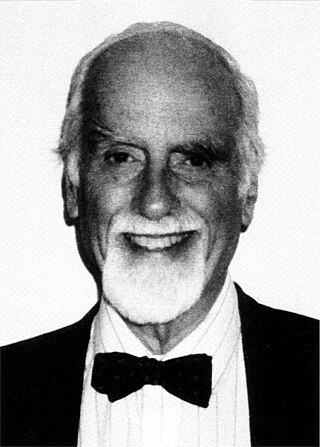Related Research Articles
Educational psychology is the branch of psychology concerned with the scientific study of human learning. The study of learning processes, from both cognitive and behavioral perspectives, allows researchers to understand individual differences in intelligence, cognitive development, affect, motivation, self-regulation, and self-concept, as well as their role in learning. The field of educational psychology relies heavily on quantitative methods, including testing and measurement, to enhance educational activities related to instructional design, classroom management, and assessment, which serve to facilitate learning processes in various educational settings across the lifespan.

Emotions are physical and mental states brought on by neurophysiological changes, variously associated with thoughts, feelings, behavioral responses, and a degree of pleasure or displeasure. There is no scientific consensus on a definition. Emotions are often intertwined with mood, temperament, personality, disposition, or creativity.
Psychology is the study of mind and behavior. Its subject matter includes the behavior of humans and nonhumans, both conscious and unconscious phenomena, and mental processes such as thoughts, feelings, and motives. Psychology is an academic discipline of immense scope, crossing the boundaries between the natural and social sciences. Biological psychologists seek an understanding of the emergent properties of brains, linking the discipline to neuroscience. As social scientists, psychologists aim to understand the behavior of individuals and groups.
Psychological egoism is the view that humans are always motivated by self-interest and selfishness, even in what seem to be acts of altruism. It claims that, when people choose to help others, they do so ultimately because of the personal benefits that they themselves expect to obtain, directly or indirectly, from doing so.
Gestalt psychology, gestaltism, or configurationism is a school of psychology and a theory of perception that emphasises the processing of entire patterns and configurations, and not merely individual components. It emerged in the early twentieth century in Austria and Germany as a rejection of basic principles of Wilhelm Wundt's and Edward Titchener's elementalist and structuralist psychology.
Operant conditioning, also called instrumental conditioning, is a learning process where voluntary behaviors are modified by association with the addition of reward or aversive stimuli. The frequency or duration of the behavior may increase through reinforcement or decrease through punishment or extinction.
Psychology is an academic and applied discipline involving the scientific study of human mental functions and behavior. Occasionally, in addition or opposition to employing the scientific method, it also relies on symbolic interpretation and critical analysis, although these traditions have tended to be less pronounced than in other social sciences, such as sociology. Psychologists study phenomena such as perception, cognition, emotion, personality, behavior, and interpersonal relationships. Some, especially depth psychologists, also study the unconscious mind.

Motivation is an internal state that propels individuals to engage in goal-directed behavior. It is often understood as a force that explains why people or animals initiate, continue, or terminate a certain behavior at a particular time. It is a complex phenomenon and its precise definition is disputed. It contrasts with amotivation, which is a state of apathy or listlessness. Motivation is studied in fields like psychology, motivation science, and philosophy.
A social behavior theory which proposes that new behaviors can be acquired by observing and imitating others. Albert Bandura is known for studying this theory. It states that learning is a cognitive process that takes place in a social context and can occur purely through observation or direct instruction, even in the absence of motor reproduction or direct reinforcement. In addition to the observation of behavior, learning also occurs through the observation of rewards and punishments, a process known as vicarious reinforcement. When a particular behavior is rewarded regularly, it will most likely persist; conversely, if a particular behavior is constantly punished, it will most likely desist. The theory expands on traditional behavioral theories, in which behavior is governed solely by reinforcements, by placing emphasis on the important roles of various internal processes in the learning individual.
In philosophy of mind and cognitive science, folk psychology, or commonsense psychology, is a human capacity to explain and predict the behavior and mental state of other people. Processes and items encountered in daily life such as pain, pleasure, excitement, and anxiety use common linguistic terms as opposed to technical or scientific jargon. Folk psychology allows for an insight into social interactions and communication, thus stretching the importance of connection and how it is experienced.
Behaviorism is a systematic approach to understand the behavior of humans and other animals. It assumes that behavior is either a reflex evoked by the pairing of certain antecedent stimuli in the environment, or a consequence of that individual's history, including especially reinforcement and punishment contingencies, together with the individual's current motivational state and controlling stimuli. Although behaviorists generally accept the important role of heredity in determining behavior, they focus primarily on environmental events. The cognitive revolution of the late 20th century largely replaced behaviorism as an explanatory theory with cognitive psychology, which unlike behaviorism examines internal mental states.

The Principles of Psychology is an 1890 book about psychology by William James, an American philosopher and psychologist who trained to be a physician before going into psychology. The four key concepts in James' book are: stream of consciousness ; emotion ; habit ; and will.
The psychology of learning refers to theories and research on how individuals learn. There are many theories of learning. Some take on a more behaviorist approach which focuses on inputs and reinforcements. Other approaches, such as neuroscience and social cognition, focus more on how the brain's organization and structure influence learning. Some psychological approaches, such as social constructivism, focus more on one's interaction with the environment and with others. Other theories, such as those related to motivation, like the growth mindset, focus more on individuals' perceptions of ability.
The law of effect, or Thorndike's law, is a psychology principle advanced by Edward Thorndike in 1898 on the matter of behavioral conditioning which states that "responses that produce a satisfying effect in a particular situation become more likely to occur again in that situation, and responses that produce a discomforting effect become less likely to occur again in that situation."
The intentional stance is a term coined by philosopher Daniel Dennett for the level of abstraction in which we view the behavior of an entity in terms of mental properties. It is part of a theory of mental content proposed by Dennett, which provides the underpinnings of his later works on free will, consciousness, folk psychology, and evolution.
Here is how it works: first you decide to treat the object whose behavior is to be predicted as a rational agent; then you figure out what beliefs that agent ought to have, given its place in the world and its purpose. Then you figure out what desires it ought to have, on the same considerations, and finally you predict that this rational agent will act to further its goals in the light of its beliefs. A little practical reasoning from the chosen set of beliefs and desires will in most instances yield a decision about what the agent ought to do; that is what you predict the agent will do.
In psychology, mentalism refers to those branches of study that concentrate on perception and thought processes, for example: mental imagery, consciousness and cognition, as in cognitive psychology. The term mentalism has been used primarily by behaviorists who believe that scientific psychology should focus on the structure of causal relationships to reflexes and operant responses or on the functions of behavior.

Observations on Man, his Frame, his Duty, and his Expectations is 18th-century British philosopher David Hartley's major work. Published in two parts in 1749 by Samuel Richardson, it puts forth Hartley's principal theories: the doctrine of vibrations and the doctrine of associations. The first part of the text deals with the frame of the human body and mind, and their mutual connections and influences, the second with the duty and expectations of mankind.
Functional psychology or functionalism refers to a psychological school of thought that was a direct outgrowth of Darwinian thinking which focuses attention on the utility and purpose of behavior that has been modified over years of human existence. Edward L. Thorndike, best known for his experiments with trial-and-error learning, came to be known as the leader of the loosely defined movement. This movement arose in the U.S. in the late 19th century in direct contrast to Edward Titchener's structuralism, which focused on the contents of consciousness rather than the motives and ideals of human behavior. Functionalism denies the principle of introspection, which tends to investigate the inner workings of human thinking rather than understanding the biological processes of the human consciousness.

David Clarence McClelland was an American psychologist, noted for his work on motivation Need Theory. He published a number of works between the 1950s and the 1990s and developed new scoring systems for the Thematic Apperception Test (TAT) and its descendants. McClelland is credited with developing Achievement Motivation Theory, commonly referred to as "need for achievement" or n-achievement theory. A Review of General Psychology survey published in 2002, ranked McClelland as the 15th most cited psychologist of the 20th century.
Psychological behaviorism is a form of behaviorism—a major theory within psychology which holds that generally human behaviors are learned—proposed by Arthur W. Staats. The theory is constructed to advance from basic animal learning principles to deal with all types of human behavior, including personality, culture, and human evolution. Behaviorism was first developed by John B. Watson (1912), who coined the term "behaviorism", and then B. F. Skinner who developed what is known as "radical behaviorism". Watson and Skinner rejected the idea that psychological data could be obtained through introspection or by an attempt to describe consciousness; all psychological data, in their view, was to be derived from the observation of outward behavior. The strategy of these behaviorists was that the animal learning principles should then be used to explain human behavior. Thus, their behaviorisms were based upon research with animals.
References
- ↑ Nuckolls, C. (2004). "Toward a cultural psychology of voluntary action beliefs". Anthropos. 99 (2): 411–425. JSTOR 40466389.
- 1 2 Hommel, B.(2003). "Acquisition and control of voluntary action", pp. 34–48 in Roth, Gerhard (Ed.) Voluntary action: Brains, minds, and sociality. New York, NY: Oxford University Press
- ↑ James, W. (1890). The Principles of Psychology, Vol 2. New York, NY: Holt & Co.